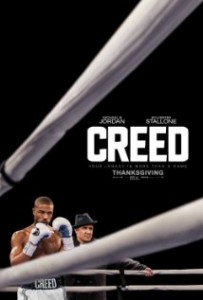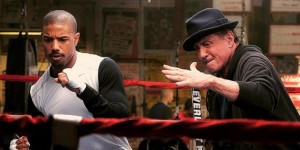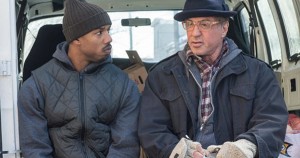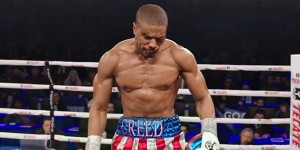 “Time takes everyone. It’s undefeated.” -Rocky Balboa
“Time takes everyone. It’s undefeated.” -Rocky Balboa
I know what you’re thinking, at least if you haven’t already seen Creed – the seventh installment of the Rocky franchise: did we really need another boxing movie? It’s a fair question, especially as the popularity of the noble sport wanes against the rise of MMA. And the answer is: yes, we needed this film.
Creed is a powerful a celebration of the inherent value of life in the face of our inevitable mortality.
Few genres are as equipped to examine this theme as boxing films – doubtless one reason they persist. Boxing as a sport is about as purely human as we have (it’s also one of the oldest and most universal). Though the sport is ostensibly about who’s the strongest in the ring, even a cursory exploration of the fundamentals of boxing reveal that it’s really about which fighter is most in control of their own body. Boxing is really about testing the limits of our physical bodies – it’s the fighter who’s more disciplined, more mentally tough, who usually wins.
No wonder, then, boxing is a sport for the young. Though the surprisingly good 2006 Rocky Balboa addressed Rocky’s aging, Rocky was still in the ring. In 2015, by the time we meet Rocky, he’s nowhere near capable of climbing back into the ring.
Which is why this seventh film is called Creed. This film belongs to Adonis “Don” Johnson, the illegitimate son of Apollo Creed, Rocky’s nemesis turned friend and trainer. Apollo’s widow, Mary Anne, discovered Don in a juvenile detention center and adopted him – but she also forbade anyone in Los Angeles to teach him to fight. When we jump to the present day, we meet a Don who is capable, successful, and miserable. He wasn’t made to sit at a desk; he was made to fight.
The film doesn’t go far to explain why Don “just has to fight”, but it works in Don’s arc.
 He fights because he is a Creed and the Creeds are fighters. At the same time, Don lives in the shadow of the father he never knew, and wants to make a name for himself (rather than using his father’s famous name). For much of the film, he lives in the tension of being his father’s son, but not wanting to embrace that legacy.
He fights because he is a Creed and the Creeds are fighters. At the same time, Don lives in the shadow of the father he never knew, and wants to make a name for himself (rather than using his father’s famous name). For much of the film, he lives in the tension of being his father’s son, but not wanting to embrace that legacy.
It’s chasing that legacy that leads Don to Rocky’s doorstep. Through some cajoling, Don convinces Rocky to train him, and the larger themes of the film begin to come into focus. Rocky is an old, grizzled veteran of the sport training a young, hungry but unskilled fighter to face an unbeatable world champion. If you think that sounds exactly like the plot of the original Rocky (which was released in 1976!), you’re right, and that’s completely on purpose. Rocky is now Mick, and he’s imparting all the knowledge he’s accumulated from his years of hard-won experience to someone following in his footsteps.
You want to know what Creed is really about? It’s about legacy.
 When Rocky is diagnosed with cancer, he initially refuses treatment. Rocky believes he has nothing left to live for. Mickey is dead. Apollo is dead. Adrian is dead (of cancer). Paulie is dead. His son is estranged, living nearly as far from Rocky and his legacy as he can. Rocky feels bereft, alone, the last inhabitant of a life stripped of meaning or purpose by the inevitable march of time.
When Rocky is diagnosed with cancer, he initially refuses treatment. Rocky believes he has nothing left to live for. Mickey is dead. Apollo is dead. Adrian is dead (of cancer). Paulie is dead. His son is estranged, living nearly as far from Rocky and his legacy as he can. Rocky feels bereft, alone, the last inhabitant of a life stripped of meaning or purpose by the inevitable march of time.
Don insists Rocky fight, and makes the film’s central metaphor obvious: just as boxing is a test of the limits of the human condition, so too is life itself. Boxing is a way to strain against the bonds of mortality, to see how far will can drive the flesh. No body can endure forever, so boxing is about whose can endure longer. In the same way, Death comes for all of us. In the face of the inevitable, we can either sit down or we can fight.
In the film’s closing sequence, Rocky once again climbs those iconic steps, only this time, he isn’t running. He’s hobbling, forced to lean on Don much of the way up. Rocky is done. His story is nearly over. But he will continue to fight, to make meaning by giving everything he’s learned to this young man who is walking in his footsteps.
 Don, meanwhile, has made peace with his own legacy. He has stopped fighting who he is, and the harmony he finds inside of himself allows him to stand tall against an unbeatable opponent, to take his rightful place in the world. His namesake is an Ancient Near Eastern deity who eventually made his way into Greco-Roman mythology. He’s closely tied to Spring, resurrection and new life. And so we see: even after death, both Apollo and Rocky will live on in this young man, this harbinger of rebirth.
Don, meanwhile, has made peace with his own legacy. He has stopped fighting who he is, and the harmony he finds inside of himself allows him to stand tall against an unbeatable opponent, to take his rightful place in the world. His namesake is an Ancient Near Eastern deity who eventually made his way into Greco-Roman mythology. He’s closely tied to Spring, resurrection and new life. And so we see: even after death, both Apollo and Rocky will live on in this young man, this harbinger of rebirth.
It would be easy for Christians to read Creed as a humanist film: Creed makes a name for itself because the Sun God – Apollo – is dead. Death of God theologies challenge us to embrace the inherent meaninglessness of reality – there is no God waiting in the wings to come and save us. Since there is no resurrection, no afterlife, we create meaning by “raging against the dying of the light”. But we should never let the promise of resurrection devalue the life we have here and now. Any Christian can and should celebrate a film that challenges us to make the most of every moment we have, to rage against Death (which our Scriptures call “the final enemy”). The promise of resurrection does not diminish the gift of the present. Both Rocky and Creed are notable in that their respective heroes don’t win. Because winning isn’t the point. The point is standing tall, going the distance, fighting the good fight. Let us attend well.
No review of Creed should fail to mention the stellar acting from both Michael B. Jordan and Sylvester Stallone. I’d be surprised if both men don’t get nods from the Academy. Ryan Coogler’s directing was also innovative, particularly in the ring (he directed Jordan in the criminally under-appreciated Fruitvale Station).
 Few franchises make it to seven films. Fewer still can boast #7 as among the best in the franchise. Could it be that 2015 will be know as the year of the 7s, with Furious 7, Creed and – hopefully – The Force Awakens proving to be exceptions to the rule? Here’s hoping we get five more Creed films, and then Rocky’s grandson tracks down an aging Adonis to learn more about his estranged grandfather (and learn to fight) and we get a Balboa franchise.
Few franchises make it to seven films. Fewer still can boast #7 as among the best in the franchise. Could it be that 2015 will be know as the year of the 7s, with Furious 7, Creed and – hopefully – The Force Awakens proving to be exceptions to the rule? Here’s hoping we get five more Creed films, and then Rocky’s grandson tracks down an aging Adonis to learn more about his estranged grandfather (and learn to fight) and we get a Balboa franchise.
I just want to know one thing: When can I get my tickets for Creed II?

3 comments